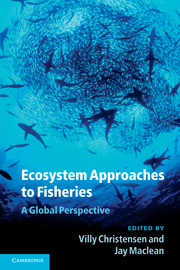1 - Introduction: toward ecosystem-based management of fisheries
Published online by Cambridge University Press: 05 June 2012
Summary
Fisheries have always been important to humanity. In the last century we have, however, witnessed how industrialization of fisheries leads to widespread overexploitation of fish populations. Our general reaction has been to strengthen the call for fisheries management, even if opinions of what this requires differ.
The idea of managing at the ecosystem level has been around for years (McIntosh, 1985), and numerous international agreements make it clear that this is the way forward for management for fisheries as well as for many other resources, such as forestry. Yet, there is considerable uncertainty in the minds of most scientists, environmentalists, managers, and policymakers, of what the term actually implies. Many definitions have been put forward, and we are slowly and gradually getting a clearer picture of what is involved in implementing ecosystem-based management of fisheries.
Pikitch et al. (2004) stated that approaches to ecosystem-based management of fisheries should avoid degradation of ecosystems while minimizing the risk of irreversible change therein, consider how to obtain and maintain long-term socioeconomic benefits, and in the process gain an understanding of the likely consequences of human actions. Clearly, area-based management has to be an integral part of ecosystem management, and it must be carried out so as to balance conflicting trade-offs and ensure long-term economic and social sustainability. Implementing ecosystem-based management requires going beyond traditional management and business-as-usual, and this is, in essence, what has dictated the content selection for this book.
Information
- Type
- Chapter
- Information
- Ecosystem Approaches to FisheriesA Global Perspective, pp. 1 - 8Publisher: Cambridge University PressPrint publication year: 2011
References
Accessibility standard: Unknown
- 2
- Cited by
